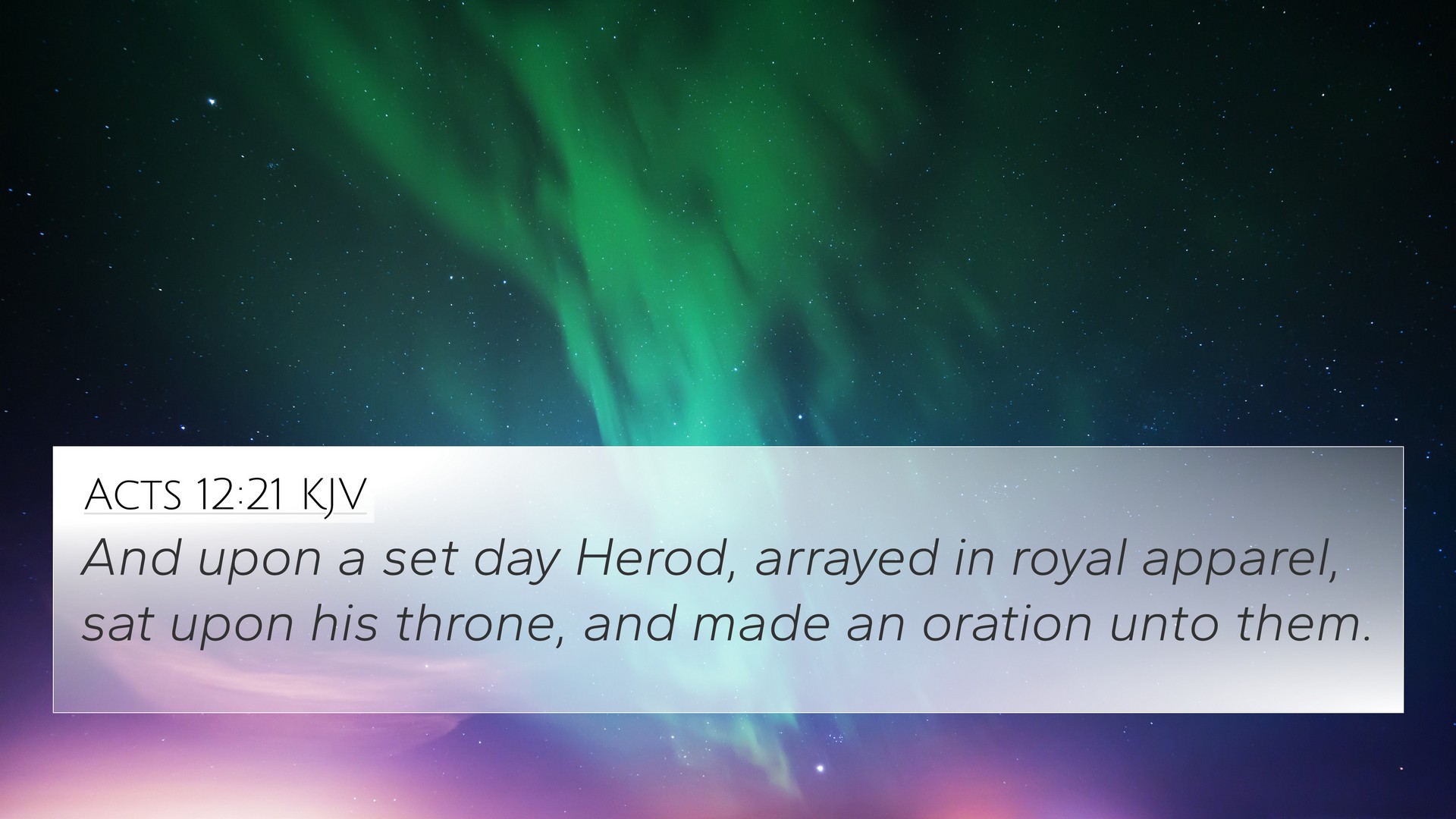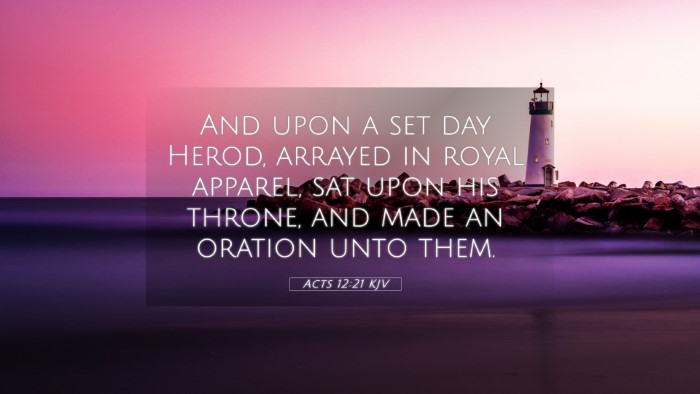Old Testament
Genesis Exodus Leviticus Numbers Deuteronomy Joshua Judges Ruth 1 Samuel 2 Samuel 1 Kings 2 Kings 1 Chronicles 2 Chronicles Ezra Nehemiah Esther Job Psalms Proverbs Ecclesiastes Song of Solomon Isaiah Jeremiah Lamentations Ezekiel Daniel Hosea Joel Amos Obadiah Jonah Micah Nahum Habakkuk Zephaniah Haggai Zechariah MalachiActs 12:21 Similar Verses
Acts 12:21 Cross References
And upon a set day Herod, arrayed in royal apparel, sat upon his throne, and made an oration unto them.
Uncover the Rich Themes and Topics of This Bible Verse
Listed below are the Bible themes associated with Acts 12:21. We invite you to explore each theme to gain deeper insights into the Scriptures.
Acts 12:21 Cross Reference Verses
No cross reference images were found in our system for this Bible passage.
Acts 12:21 Verse Analysis and Similar Verses
Understanding Acts 12:21
Acts 12:21 states: "And upon a set day Herod, arrayed in royal apparel, sat upon his throne, and made an oration unto them." This verse captures a critical moment in the life of King Herod, demonstrating his arrogance and the eventual consequences of his pride.
Summary of Insights
This passage sheds light on Herod’s character and his role in the early chapters of Acts. Various commentaries reveal deeper meanings connected to this verse, discussing themes of pride, divine judgment, and the faith of early Christians.
Matthew Henry's Commentary
Matthew Henry emphasizes the arrogance of Herod as he seeks the adoration of his subjects. He notes that Herod’s desire for praise highlights a recurrent theme in Scripture: the perils of pride and self-exaltation. Henry argues that Herod's oratory is a diversion meant to showcase his significance rather than leading others to God. His pomp and circumstance stand in stark contrast to the humility required in true leadership.
Albert Barnes's Commentary
Albert Barnes provides insight into the historical context of Herod's reign, noting that his alignment with the Roman authorities contributed to his inflated sense of power. Barnes points out that the "set day" indicates a deliberate and ceremonial display of authority, suggesting that Herod sought to consolidate his power over the people. Furthermore, Barnes draws parallels with other leaders in biblical history who were similarly struck down for their pride and disregard for God’s sovereignty.
Adam Clarke's Commentary
Adam Clarke offers an in-depth examination of Herod's actions, suggesting that his royal apparel signifies his desire not only to impress his listeners but to elevate himself over God. Clarke argues that this display foreshadows the judgment that is to come, as those who exalt themselves will be humbled. This commentary also connects this event to prophetic warnings found in the Scriptures regarding pride and its ultimate consequences.
Cross-References and Related Bible Verses
- Daniel 4:37: “Now I, Nebuchadnezzar, praise and extol and honor the King of heaven; all of whose works are truth, and His ways judgment: and those that walk in pride he is able to abase.” This verse highlights God's sovereignty over rulers.
- James 4:6: “But he giveth more grace. Wherefore he saith, God resisteth the proud, but giveth grace unto the humble.” A reminder of God’s attitude towards pride.
- Proverbs 16:18: “Pride goeth before destruction, and a haughty spirit before a fall.” Illustrates the destructive nature of pride.
- Luke 14:11: “For whosoever exalteth himself shall be abased; and he that humbleth himself shall be exalted.” A direct connection to the themes in Acts 12:21.
- Isaiah 14:12-15: Discusses the fall of Lucifer, another proud figure ultimately judged for his arrogance.
- Acts 12:23: Links Herod’s prideful oration to his subsequent divine punishment.
- Matthew 23:12: “And whosoever shall exalt himself shall be abased; and he that shall humble himself shall be exalted.” Further reiteration of the principle of humility.
Thematic Connections
Acts 12:21 provides a rich tapestry of themes that interweave throughout Scripture. Observing the cross-references, we discover connections that illuminate the consequences of arrogance, the power of humility, and the inevitability of divine judgment against those who seek glory for themselves rather than for God.
Connecting Themes Across Scriptures
- Pride and Its Consequences: Biblical figures such as Nebuchadnezzar and Lucifer serve as warnings against pride.
- Humility Before God: Numerous scriptures advocate for humility as the path to true exaltation.
- God's Sovereign Authority: The overarching theme of God’s control over earthly rulers is persistent throughout the Old and New Testaments.
- The Role of Leadership: Biblical teachings frequently highlight the responsibilities and dangers associated with leadership.
Tools for Deeper Understanding
For those wishing to explore these themes further, tools for Bible cross-referencing can enhance your study. A Bible concordance allows believers to delve into specific words and their usages across the Biblical text, while a cross-reference Bible study guide can illuminate connections that might not be immediately obvious.
How to Use Bible Cross-References
- Begin with a verse such as Acts 12:21 and look for related themes.
- Identify keywords in the verse to find other scriptures that link thematically.
- Follow cross-references in your study Bible to see how this verse interacts with others throughout Scripture.
- Reflect on the overall message that emerges from these connections to grasp the fuller meaning behind the text.
Conclusion
Acts 12:21 serves as a potent reminder of the profound truths embedded within Scripture regarding pride, leadership, and obedience to God. As believers engage with this verse and its connections to other scriptures, they can gain a deeper understanding of the nature of divine authority and the importance of humility in their own lives.


